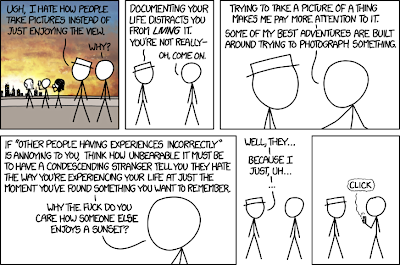Networked Lenses
With the advent of the smartphone, the
digital camera became ubiquitous. And soon photos of cats, sunsets, breakfasts
and selfies began to rule the day. No wonder then that every time Instagram
goes down, news sites have fun with lines like “Breakfasts
everywhere went undocumented” or “Instagram is down –
just describe your lunch to me”!
But has the smartphone-Internet combo
really ruined photography? Isn’t Alex Furman’s point on the “immensely valuable
and often overlooked” aspects of photography just as true today:
“It forces you to see the world around
you in a completely different way. It teaches you to find beauty and impact and
symbolism in places that most people wouldn’t grace with a second look.
Photography teaches you to pay attention and to appreciate. It’s about seeing
much more than it is about capturing what you see.”
What did the smartphone-Internet combo
change?
“Now we have legitimately capable cameras
in our cell-phones, complete with filters and functions that make pictures look
“artsy” with a click of a button. Another click of a button, and they’re on the
web for all to see and appreciate.”
And that’s what many dislike today, the
fact that:
“You can click away until the cows come
home, producing masterpiece after masterpiece.”
Chris Mod gave some serious
thought and points out that the smartphone-Internet combo:
“squish(es) the full spectrum of
photographic storytelling: capture, edit, collate, share, and respond.”
The turnaround time from click to
applause fell by several orders.
Those who argue that the smartphone
camera is nowhere near the quality of a DSLR are obviously right. But does that
even matter in the Internet world, asks Mod:
“While we’ve long obsessed over the size
of the film and image sensors, today we mainly view photos on networked
screens—often tiny ones, regardless of how the image was captured—and networked
photography provides access to forms of data that go beyond pixels…like location,
weather, or even radiation levels…Once you start thinking of a photograph in
those holistic terms, the data quality of stand-alone cameras, no matter how
vast their bounty of pixels, seems strangely impoverished. They no longer capture the whole picture.”
Like it or not, perhaps Mod is right when
he says:
“We see cameras transitioning into what
they were bound to become: networked lenses.”
In any case,
it’s a free country, as this xkcd comic
summarizes so well.

Comments
Post a Comment